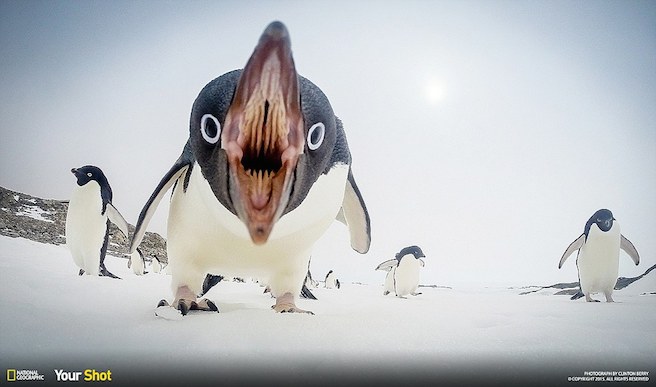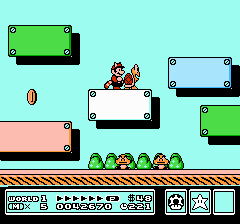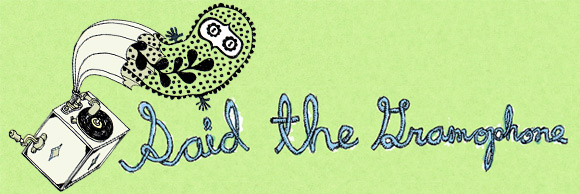
Man Meets Bear - "Odeno".
It's nice, sometimes, to imagine musical artists as varieties of tropical fish. I don't know much about tropical fish but I figure that people who do have clear preferences. They're like: "I'm an angel-fish kind of dude." They're like: "Me I prefer rays." Two lovers of tropical fish may find that they are incompatible because they prefer different sorts of groupers.
Me I like lots of kinds of tropical fish but I have a particularly soft spot for the phylum that comprises weary, careworn rock'n'roll. In this section of the pet-store there would be tanks full of Velvet Underground, Bedhead and Microphones, maybe a fresh shipment of Frankie Cosmos. Lots of the aquariums would have been filled back in the late 90s. You could wander the aisles with a clear plastic bag and water inside, plucking out riffs and tom hits, little squalls of distortion. Mumbled crumbs of fish food. The fish would have names like rambles and shambles and grouches.
This is a roundabout and stupid way of coming to "Odeno." But it is my way of speaking about its silver bands and purple spots, its tiny mouth and jagged teeth. This is a beautiful, noisy song that one ought to find at the darkened back of the tropical fish store, under neon lights, oxidizers, filtration systems. A song that ought to live, alive and swimming, among elaborate processes that do not pay adequate attention to it. Solitary and strong, like a fish in a tank. Surprising, if you observe it carefully. Surprising as any living thing, with a flicker in its tail.
[from Volume 4 of the ever-inspiring Berlin Songs compilations / procure here]
New Dog - "Here All Days".
I have a son now. I don't have the time here, now, to tell you all about it. He's sleeping; he'll be up soon. His eyelids are shiny, like someone's daubed them with wax. His eyes, under those lids, are blue.
Having a kid changes a great many things. I'm only just uncovering all the things it changes. It changes my sense of myself, my vision of other people. It changes my itinerary. When my partner puts on Serge Gainsbourg or Bach or Super Ape, and our little boy is listening, it changes the way I hear that music.
But having a child also changes the music he isn't listening to. He's sleeping now, he hasn't heard "Here All Days", not yet. Yet this is a song I listened to many times before he was born. Lonely and contemplative, silver with dusky light. What I heard before was its melancholy, its rearward reflection, Anar Badalov's poetry like the unspooling footage of a previous evening. All the people that I love / I can count you on one hand / the other one I keep in my pocket. It was a story of letdowns, foreshadowings.
Now I hear it differently. My dad / he taught me never to run, Badalov sings. I hear that word, "dad", and it lands differently. Some trust the moon they've known since birth / Some hang onto their mothers' words. My home, these days, is filled with mothers' words. I remember when my mother-in-law printed out this little boy's horoscope, for fun. We read it. We imagined him.
"Here All Days" is the same song it was. A song of rearward reflection, lonely and contemplative. But now I find that it is also pointing toward tomorrow. It is a person's possible future - not an ugly future, just a dusky one, a little sad, a little true. I can't hear it without thinking of M listening to it, on some long-distant night, wherever he is. My dad / he taught me / never to run. Is that what I will teach him? When will I decide?
[buy the beautiful Teeth Marks]
Surf Harp - "POOL BOY". I came to adore this song without ever listening to the words. I heard the words but I didn't listen to them. The lyrics were like geometric objects, floating place-holders, among all of "POOL BOY"'s crisscrossing pleasures. The content mattered less than the sound, and less than the drums' redoubled smashes, the squeaks of sax, the ladders of guitars all lonesome, crowded, west. It was only when I sat down to write about this song that I paid attention to what Surf Harp's singer is singing. Only then did I try to squint with my ears, straining to understand. Only then did I read the lyrics on the band's bandcamp page. And so I come to you from the other side, the land of full comprehension, with advice: the words don't matter very much. They are vivid and melting and good, they are broken and knitted at the same time. But they matter less than the fact of them as geometric objects, the sound of them alone or in chorus; they matter less than the smashes, the sax, the crowded guitars. Talk is cheap, cacophony is precious. You don't need plain poetry with your sweet-and-sourest pop music, your brightest darts of dab. You don't need someone murmuring advice. Mostly you need the song to hit the hot air and soar. To glide and glide, higher, as the sunset turns its colour. To float forever, past the fadeout, into the eye.
[Surf Harp are from Baltimore / they're kinda magnificent / buy PEEL and make them yours]
Rostam - "Gravity Don't Pull Me". The syrup wash of heartbreak, certain heartbreaks. Some heartbreaks are syrup wash, others are ice dazzle, others are hail. Some are black hole. At the Planetarium you sit back in low chairs and they sweep you through the universe. Atmosphere, horsehead, milkyway. Syrup wash, ice dazzle, blac hole, hail. Between the shows you sip cold water from a gray fountain, a tall stream. You're gone and floating. You're gone and falling. No, he's the one who's gone. There's a rip in the sky that isn't quite seen, that isn't quite visible, along beside the bare-blue white squint of sun. If you could find the rip you'd go there, you'd slip through. You'd fold in beside the lost parts. There is a button on the side of each chair that lets you adjust the height and incline according to your preferences. [video]
10:21 AM on Mar 21, 2016.
Mitski - "Your Best American Girl". People tell you, when you're young, that music moves in cycles. They say that your favourite new band sounds like their favourite old band; they say it's retro, re-heated, re-hashed. You say no. You say no this is a bit like that shitty dusty old band but mostly it's different; this is fresh and utterly, absolutely alive. Your favourite new band is the most important thing in the world and it is like a jewel hidden in the cabinet of your chest, something no one who is older can fully understand. You say this with absolute certainty, staring them straightly, darkly, in the eyes. Your gaze does not waver. It doesn't drop. You know it. This is young and whole and wholly mine.
But then of course you yourself get older. After ten years of listening, fifteen, twenty, you have the same straight, dark gaze. You have the same seriousness of listening, you hope you do. Yet there are more lines around your eyes. A skepticism has set in, or a weariness. You have heard so much music, so much whole and transformative music; so much music has meant so much to you; and now the cycles have come round and round and there are things that sound so much like the things you discovered at the beginning, and the feeling you have is that this music is redundant. That it is attempting something that others already attempted. (It's attempting something that others already attempted and, perhaps, others already solved.)
Perhaps you say so to the kids. You tell them their favourite new band sounds like your favourite old band. You say it's re-heated. And they stare at you with their dark young eyes.
Because you're wrong.
You're not mistaken but you're wrong. Because listening to music should not be a conversation about knowledge, a conversation about taste. It should not be a conversation about evaluating a song's antecedents. Those conversations run into dead-ends: stubbornness, defensiveness, distrust of elders, contempt for youth. Fundamentally they run into the dead-end of each of our accumulated sets of experiences, unique and incomprehensible. "Knowledge" starts with self-knowledge, "taste" is secret, incontestable.
Instead, we should come to these conversations the same way we come to weddings.
We sit and listen. With flowers and booze, manners, affection, our gladdest garments. Our friends tell us about their love and we try to let that love light and fill the space. We do not question it; we do not compare it; we do not challenge it against the other loves we have known or witnessed. While the wedding lasts, until the last toes leaves the dance floor, we do everything we can to feel each other's happiness.
Everything new is also old. In youth we should try harder to understand the way we are linked by our loves to all the songs and singers and listeners that came before, the string of dark straight looks that leads back through yesterday to long ago. In older years, with that flimsy experience, we should be humble enough to learn that the shadings of a new thing matter: that the smallest aspects of its reinvention can amount to transformation. It matters that a synthesizer is playing this part; or it matters that the line is about an email, not a letter; or it matters that a woman is singing these lines. It matters that a young person is singing these lines, a young person more like you.
Mitski's "Your Best American Girl" is a wondrous song. It sounds like music I have heard before and it is also a transformation. Loving and rending, wisely demanding, rock'n'roll with its furnace in the grass. Measured syllables, guitars as loud as bagpipes, the flash of a ring as it's thrown through the air.
[buy]
11:08 AM on Mar 15, 2016.

Chairs - "Animals". A gorgeous, strange, strained cut of dappled pop. Like a giraffe's neck, a giraffe's-neck of a song; and the thick jade leaves, the sound of chewing. A sunbeam can page through you like a book, make certain things clear. "We're all animals / don't try to tell me." But then the light changes; clouds, clouds. And: "We're not animals." Which would you rather? To be an animal, not to be an animal? It depends on the masters, the pastures, the other animals in your paddock. It depends on the trees and their thick jade leaves.
Riddles are good for us. They teach us that answers that can be found, that there are truths hiding inside the things that confound us. And so I am very grateful to Chairs. A band from Montreal that records fascinating riddles. Gorgeous, strange, strained, fascinating riddles - a sour pop sound that grows like a crystal, slightly more expansive with every passing bar, every passing listen. Some guitars and some echo, some voices and reverb, it don't take much; not in the right hands, before the right mics, or from atop the right steeds. Recommended.
[bandcamp]
(photo by Alexey Trofimov, via National Geographic)

TW Walsh - "Shallow Water". This song begins, literally, with the sound of fumbling. Something is happening, some shifting of gestures, some slipping of fabrics, as the melody begins. Rising chords and falling vocals, old synths or new software, everything wet and dry at the same time. What is happening to those drums? Are they breaking or being made? It is as if Walsh is singing hopefully of defeats. Singing of defeats, defeat after defeat, inevitable defeats - and yet in a hopeful way. As if the obvious ending is in fact a twist. As if there's a cheat at the last second, sometimes you haven't noticed yet, some way that fumbling isn't fumbling. Is it something the monks know? Or the fisher-people? Is it something the musicians have found, turning dying instants into ever afters?
Maybe.
[buy/bandcamp]
11:14 PM on Feb 29, 2016.
|
about said the gramophone
This is a daily sampler of really good songs. All tracks are posted out of love. Please go out and buy the records.
To hear a song in your browser, click the  and it will begin playing. All songs are also available to download: just right-click the link and choose 'Save as...'
All songs are removed within a few weeks of posting.
Said the Gramophone launched in March 2003, and added songs in November of that year. It was one of the world's first mp3blogs.
If you would like to say hello, find out our mailing addresses or invite us to shows, please get in touch:
Montreal, Canada: Sean
Toronto, Canada: Emma
Montreal, Canada: Jeff
Montreal, Canada: Mitz
Please don't send us emails with tons of huge attachments; if emailing a bunch of mp3s etc, send us a link to download them. We are not interested in streaming widgets like soundcloud: Said the Gramophone posts are always accompanied by MP3s.
If you are the copyright holder of any song posted here, please contact us if you would like the song taken down early. Please do not direct link to any of these tracks. Please love and wonder.
"And I shall watch the ferry-boats / and they'll get high on a bluer ocean / against tomorrow's sky / and I will never grow so old again."
about the authors
Sean Michaels is the founder of Said the Gramophone. He is a writer, critic and author of the theremin novel Us Conductors. Follow him on Twitter or reach him by email here. Click here to browse his posts.
Emma Healey writes poems and essays in Toronto. She joined Said the Gramophone in 2015. This is her website and email her here.
Jeff Miller is a Montreal-based writer and zinemaker. He is the author of Ghost Pine: All Stories True and a bunch of other stories. He joined Said the Gramophone in 2015. Say hello on Twitter or email.
Mitz Takahashi is originally from Osaka, Japan who now lives and works as a furniture designer/maker in Montreal. English is not his first language so please forgive his glamour grammar mistakes. He is trying. He joined Said the Gramophone in 2015. Reach him by email here.
Site design and header typography by Neale McDavitt-Van Fleet. The header graphic is randomized: this one is by Daria Tessler.
PAST AUTHORS
Dan Beirne wrote regularly for Said the Gramophone from August 2004 to December 2014. He is an actor and writer living in Toronto. Any claim he makes about his life on here is probably untrue. Click here to browse his posts. Email him here.
Jordan Himelfarb wrote for Said the Gramophone from November 2004 to March 2012. He lives in Toronto. He is an opinion editor at the Toronto Star. Click here to browse his posts. Email him here.
our patrons
search
Archives
elsewhere
our favourite blogs
(◊ means they write about music)
Back to the World
La Blogothèque ◊
Weird Canada ◊
Destination: Out ◊
Endless Banquet
A Grammar (Nitsuh Abebe) ◊
Ill Doctrine ◊
A London Salmagundi
Dau.pe ◊
Words and Music ◊
Petites planètes ◊
Gorilla vs Bear ◊
Herohill ◊
Silent Shout ◊
Clouds of Evil ◊
The Dolby Apposition ◊
Awesome Tapes from Africa ◊
Molars ◊
Daytrotter ◊
Matana Roberts ◊
Pitchfork Reviews Reviews ◊
i like you [podcast]
Musicophilia ◊
Anagramatron
Nicola Meighan ◊
Fluxblog ◊
radiolab [podcast]
CKUT Music ◊
plethoric pundrigrions
Wattled Smoky Honeyeater ◊
The Clear-Minded Creative
Torture Garden ◊
LPWTF? ◊
Passion of the Weiss ◊
Juan and Only ◊
Horses Think
White Hotel
Then Play Long (Marcello Carlin) ◊
Uno Moralez
Coming Up For Air (Matt Forsythe)
ftrain
my love for you is a stampede of horses
It's Nice That
Marathonpacks ◊
Song, by Toad ◊
In FocusAMASS BLOG
Inventory
Waxy
WTF [podcast]
Masalacism ◊
The Rest is Noise (Alex Ross) ◊
Goldkicks ◊
My Daguerreotype Boyfriend
The Hood Internet ◊
things we like in Montreal
eat:
st-viateur bagel
café olimpico
Euro-Deli Batory
le pick up
lawrence
kem coba
le couteau
au pied de cochon
mamie clafoutis
tourtière australienne
chez boris
ripples
alati caserta
vices & versa
+ paltoquet, cocoa locale, idée fixe, patati patata, the sparrow, pho tay ho, qin hua dumplings, café italia, hung phat banh mi, caffé san simeon, meu-meu, pho lien, romodos, patisserie guillaume, patisserie rhubarbe, kazu, lallouz, maison du nord, cuisine szechuan &c
shop:
phonopolis
drawn + quarterly
+ bottines &c
shows:
casa + sala + the hotel
blue skies turn black
montreal improv theatre
passovah productions
le cagibi
cinema du parc
pop pmontreal
yoga teacher Thea Metcalfe
(maga)zines
Cult Montreal
The Believer
The Morning News
McSweeney's
State
The Skinny
community
ILX
|







